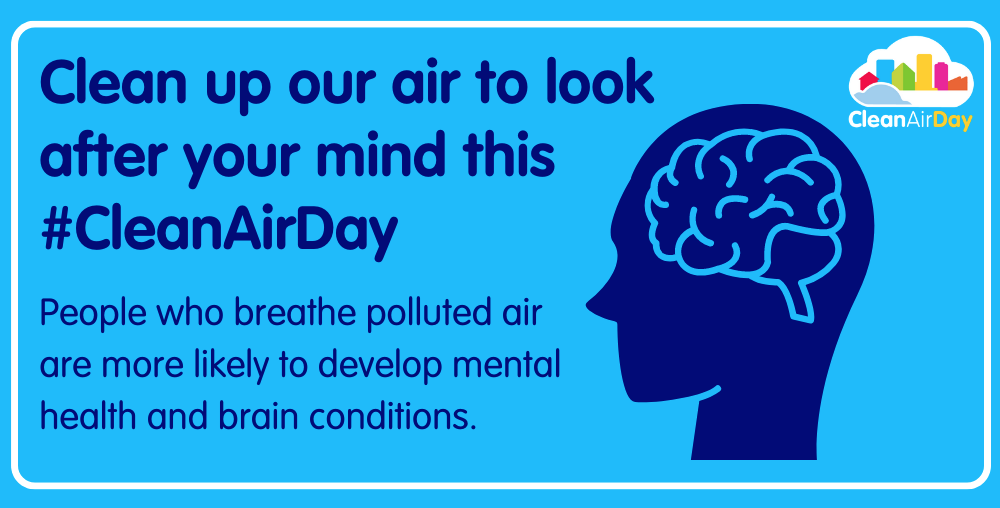Our test tells you which everyday chemicals you've recently come into contact with, and easy steps you can follow to reduce your exposure to them.
Clean Air Day, The UK's largest air pollution campaign

Thursday 15 June is Clean Air Day, a day of action to raise awareness about air pollution around the UK. This year’s theme is ‘Clean up our air to look after your mind‘, sending a strong message to us all about the health risks posed by air pollution, both physical and mental. Every year, air pollution causes up to 36,000 deaths in the UK. The World Health Organisation and the UK Government recognise that air pollution is the largest environmental health risk we face today, but the effects of air pollution on our mental wellbeing is less well documented.
In this article we present a roundup of the latest research on the impacts that air pollution is having on public health, with a focus on evidence that air pollution might be the cause of a range of mental health conditions and neurodegenerative disorders. We also share some ideas on what you can do to lower your exposure to indoor and outdoor air pollution.
The evidence about air pollution and mental health
- Air pollution may be associated with increased depressive and anxiety symptoms and behaviours, and alterations in brain regions implicated in risk of psychopathology.
- Cerebral white matter, cortical grey matter, and basal ganglia might be the targets of traffic related air pollution. The detected brain damages could be involved in cognition changes.
- PM2.5 can cause central nervous system (CNS) diseases, including a variety of neurodegenerative diseases, such as Alzheimer’s disease (AD). Activation of microglia in the central nervous
system can lead to inflammatory and neurological damage. PM2.5 will reduce the methylation level of DNA and affect epigenetics. PM2.5 enters the human body through a variety of pathways to have pathological effects on CNS. For example, PM2.5 can destroy the integrity of the blood-brain barrier (BBB), so peripheral systemic inflammation easily crosses BBB and reaches CNS.
- Evidence of Alzheimer’s, Parkinson’s and motor neurone disease found in brains of young people exposed to air pollution.
- Exposure to air pollution has been found to be associated with increased mental health service use among people recently diagnosed with psychotic and mood disorders.
- Air pollution is significantly associated with increased risk of psychiatric disorders.
- Air pollution is associated with 0.024 of standard deviation lower test scores and increased likelihood of suspension from school.
- Long-term exposure to air pollution impedes cognitive performance in verbal and math tests and becomes more pronounced as people age.
- Living close to heavy traffic is associated with a higher incidence of dementia.
- A positive association has been found between residential levels of air pollution across London and being diagnosed with dementia.
How to reduce your exposure to air pollution
- Check the air quality index before going outside to check your air quality, if it’s high, avoid exercising outdoors or wear a N95 mask in highly polluted areas (these masks filter fine particles)
- Avoid smoking, burning or using harsh chemicals
- Avoid heavily congested traffic areas/peak times where possible/feasible
- Turn off your car engine when parked up or in stationary traffic If you use a log burner, make sure the wood you are using has a low moisture content and contains no chemical additives (such as preserved wood, like pallets)
- Consider using an air purifier in your home and car
- Buy local produce to cut down emissions and walk/bike when you can
- Exercise regularly, eat a well-balanced healthy diet and get adequate sleep to strengthen your immune system so you are better able to combat the effects of air pollution
- Drink plenty of filtered or distilled water to keep hydrated so the body is better able to deal with the effects of air pollution
- Reduce your stress levels where possible – do activities that help you to relax and de-stress – some ideas may be reading, having a bath, meditation, yoga or a walk in woodland
Further Links:
Air pollution: How to reduce harm to your health – Harvard Health